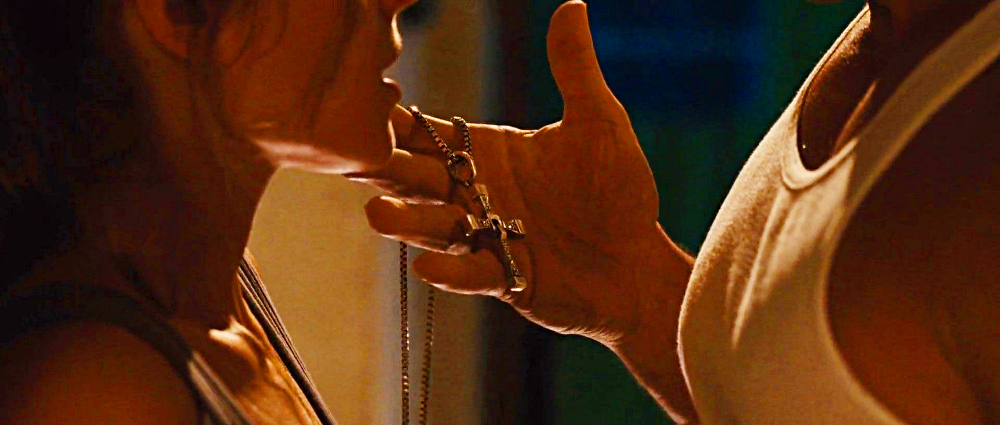
When Fast 7 raced (sorry) past the $1 billion mark, one of the attributed reasons for its success was its multi-cultural cast, one that “looks like America.” But one ingredient in the Fast & Furious franchise’s enduring popularity could be its positive depiction of America’s under-represented faith-based majority.
The Fast & Furious franchise’s main star Dominik Toretto, played by Vin Diesel, is a gruff, quasi-criminal street-racer – but the character is probably Hollywood’s most positive depiction of a Christian since Ben Hur.
He’s a papa bear who sees himself as the father of his family of racers. While his denomination is never explicitly stated, the wedding between him and Michelle Rodriguez’s Letty in Fast 7 looks pretty Catholic. The character almost always has his crucifix on, and he insists that someone say grace before every meal.
While Toretto’s faith is displayed more than any of the other characters, everyone still folds their hands and bows their head before the meal starts. This scene from the series’ first installment is played for laughs, but it’s still sincere. Fast Six ends with a similar blessing, with everyone joining hands as Tyrese Gibson’s Roman Pearce says:
Father, thank you for the gathering of friends.
We give thanks for all the choices we made because that’s what makes us who we are.
Let us forever cherish the loved ones we lost along the way.
Thank you for the little angel, the newest addition to our family.
Thank you for bringing Letty home.
And most of all, thank you for fast cars.
Faith has become a component of the franchise even outside of the film’s themselves. Fast 7’s closing song – written to memorialize the death of star Paul Walker – is entirely about relationships continuing after death, titled See You Again. (It’s the second-most viewed video in YouTube history.)
Fast Five features perhaps the most charming expression of Toretto’s faith, where he recounts how, when he was young, his father would hold a neighborhood barbecue for everyone on Sundays – but you could only come if you had been to church that day.
Still in theaters, the Fate of the Furious (the 8th in the franchise) makes Toretto’s faith an even more explicit part of the character’s story: he forgives a Cuban street racer who tried to swindle him – because he says it’s more important to try to change someone than to beat them. Later on, Toretto tricks the film’s cyber-terrorist villain, whose evil scheme involves a program called “the God’s Eye,” by planting a hidden camera in his crucifix.
Though secular academics and journalists may cheer the demise of Christianity and faith in the United States, the most recent data from the Pew Research Center finds that 70.6 percent of Americans are Christian, while another 5.9 percent adhere to non-Christian faiths – so clearly the majority of the country.
But Christians have long been absent from popular culture, or to use the parlance of the times, “under-represented.” While Jack Donaghy on 30 Rock was a political conservative and Ron Swanson on Parks and Rec was a libertarian, neither had a strong religious identity. Angela Martin on The Office was very openly Christian, but the character was mostly portrayed as a villain.
(There is that one scene in The Avengers where Black Widow tells Captain America that Thor and Loki are gods, and he insists, “There’s only one God, ma’am, and I’m pretty sure he doesn’t dress like that.” So there’s that too, I suppose.)
So it’s delightful to see Hollywood’s embrace of a positive Christian family of characters. One hopes that lesson will be a takeaway from the franchise’s success. To date, The Fast & Furious franchise has earned more than $5.1 billion worldwide, with two more films in production. The Fate of the Furious, which has contributed $1.2 billion of that, is still in theaters.


